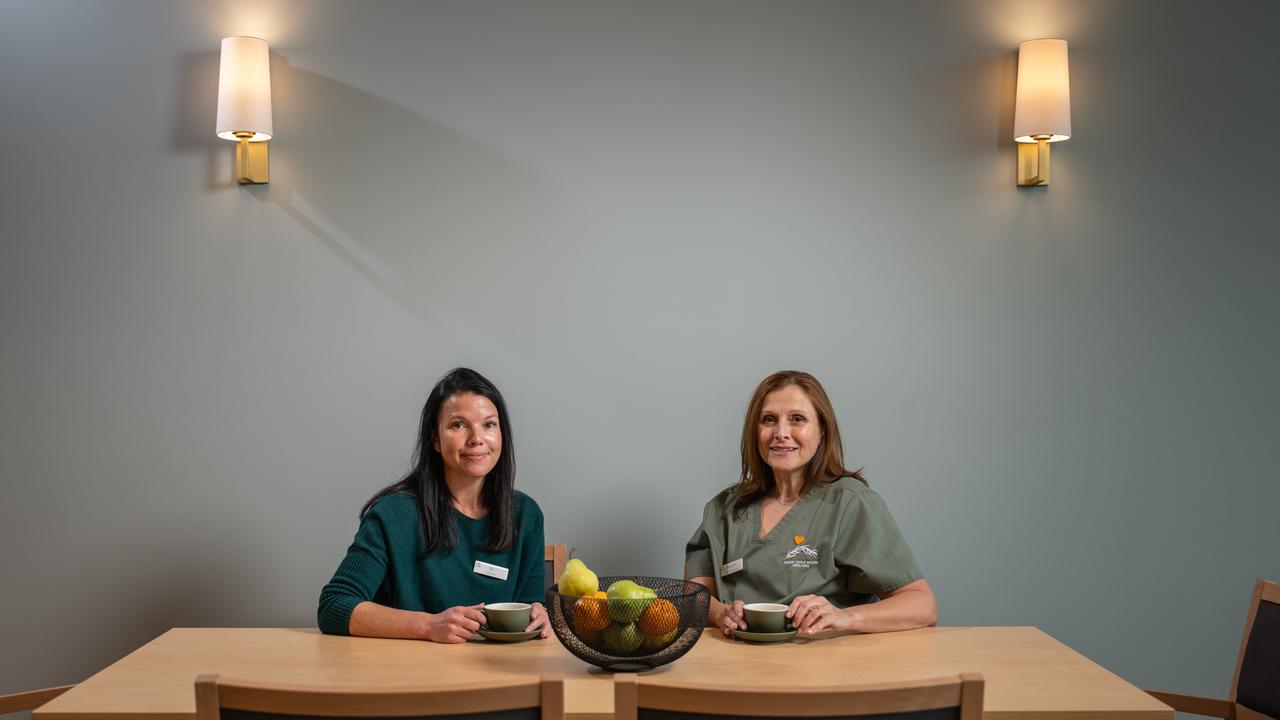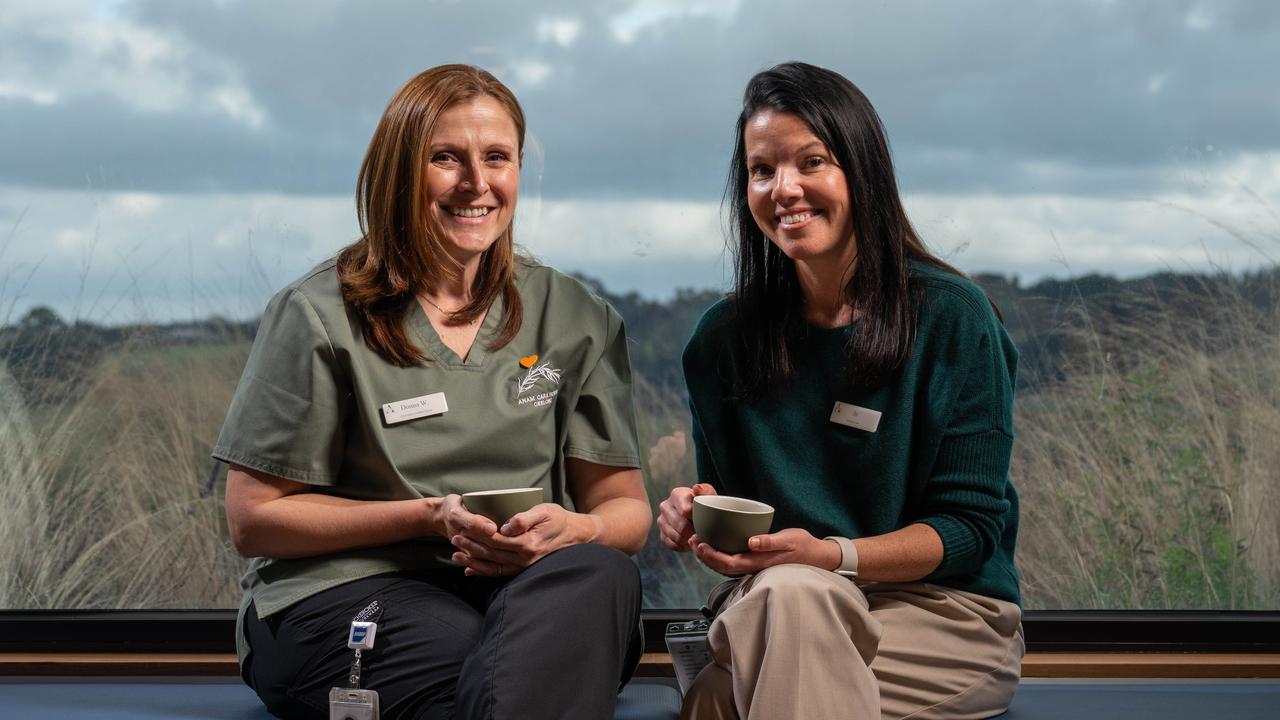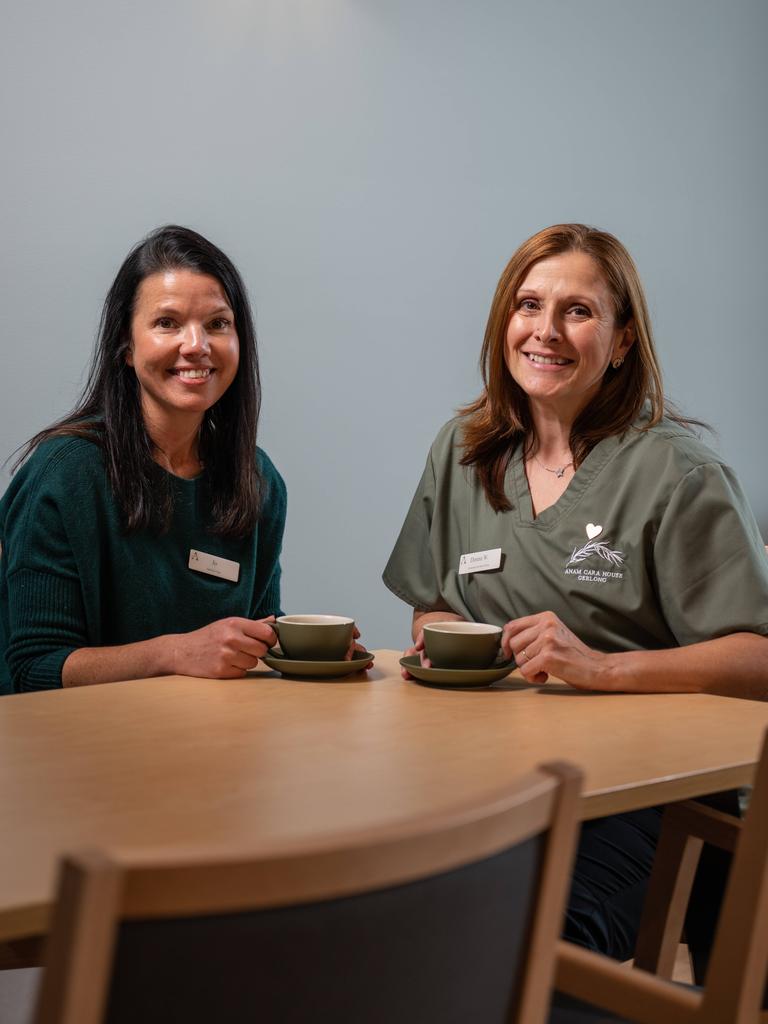From wedding celebrant to end-of-life care: How grief inspired a new career
At this Geelong health facility, patients are called “guests” and the first to die was given a guard of honour.

Geelong
Don't miss out on the headlines from Geelong. Followed categories will be added to My News.
Jo Betz was just 35 years old when her husband passed away.
It was sudden – an asthma attack – and it left her shell-shocked, and a widowed single mother.
Then a wedding celebrant and co-owner of wedding brand Ivory Tribe, she was thrown from a daily celebration of love into a timeless, nonlinear grief journey that gained momentum with the death of her father in 2022.
It was these experiences that led Ms Betz to become a spiritual care giver at Anam Cara House Geelong (ACHG).
ACHG is a palliative care facility that opened at Deakin University’s Waurn Ponds campus in January.
It had operated in Geelong for 16 years but had outgrown its four-bed residence.
Ms Betz’s role is to support the spiritual, emotional, mental and social needs of the facility’s “guests” and their families in the “lead up to death”, and beyond.
“My relationship with grief was an intimate journey … so I’m trying to give grief a voice within our community,” Ms Betz said.
ACHG staff aim to make their guests’ stay and “exit” as comfortable as possible.
The average length of stay is 14 days.
In March, ACHG experienced its first passing at its new facility.
To honour the occasion, staff performed a guard of honour in respect and spiritual care was provided.
“It’s respecting the choices of death and making sure we can facilitate that,” Ms Betz said.
“It’s asking ‘upon death, what is it that you want and need?’
“We spend time arranging how they would like to exit the facility (once they have passed).
“Whether that’s through the front door or through the gardens.
“Whether that is with a priest or their family (for their final moments).”
In 2020, Ms Betz published a “grief” journal, giving prompts through the stages of grief – from connection and anger, to loneliness, gratitude, regret and more – eventually discovering the power of sharing and acknowledging the grief of others.
After her husband’s death Ms Betz said she had become acutely aware of society’s aversion to grief’s messy, painful, nonlinear process.
“Rather than pushing down or viewing emotions as negative experiences, we need techniques to work through them,” she said.
“A big learning about grief is that its not a linear journey, its an ongoing journey.
“A stage of grief can return and cycle, meaning if you go through anger, it doesn’t meant it won’t surface again later.”

Ms Betz said she also works with the family of guests as they adjust to mortality.
“Grief is a normal and open conversation at Anam Cara House,” she said
“The only way we can tackle (the taboo) is a case-by-case, if we open up the conversations, it’s important we demonstrate and use language around death and dying, not as something to be feared.
“Often we find it hard to have tough conversations … and in the time when we need connection most often its lacking.
“It can be out of a fear of death and seeing someone that is grieving, but most people just need to be seen and heard, they don’t need answers to all their questions.”
The ACHG facility has capacity for 12 guests.
Ms Betz said voluntary assisted dying is also an option for guests, but it hasn’t yet been chosen.

According to the Victorian health department, voluntary assisted dying is for adults suffering from an incurable, advanced and progressive medical condition who are experiencing intolerable suffering.
The condition must be confirmed by two medical practitioners who declare that death would be expected within six months.
Since being legalised in June 2019, 2203 Victorians have been assessed for voluntary assisted dying eligibility.
Of those assessments 1527 permits were approved and 912 deaths have occurred via the prescribed substance.
Palliative care patients made up 81 per cent of all applicants, and 37 per cent were in regional Victoria.
Another Geelong local working close to death is Parish priest at St Bernard’s Parish in Belmont, Father Sang Ho.
Mr Ho said he was regularly in the room as families said their final goodbyes to loved ones.
He had witnessed final moments, he said, and felt the weight of that every time.
“It’s a very sad moment, but it is very sacred as well,” he said.
“That’s my privilege to be a priest … to celebrate with the family and faith.
“Every moment is a gift.”
Mr Ho said many of his elderly parishioners are well-adjusted to their own mortality, far more so than younger generations.
“I see in the elderly parishioners who come to mass, they have already prepared plans for their funerals, they have chosen songs and scriptures,” he said.
They know death is part of life, he said.
“Because they have lived lives that are fulfilled, they have seen their children and grandchildren,” Mr Ho said.
According to the Australian Institute of Health and Welfare, palliative care cases across Victoria are up 82 per cent over four years.
Palliative care needs in the Geelong region have increased dramatically, with demand for palliative care physicians up 69 per cent in the past eight years.
ACHG last week held a special community event that aimed to raise $750,000 to fund six more palliative care bedrooms.
More Coverage
Originally published as From wedding celebrant to end-of-life care: How grief inspired a new career






